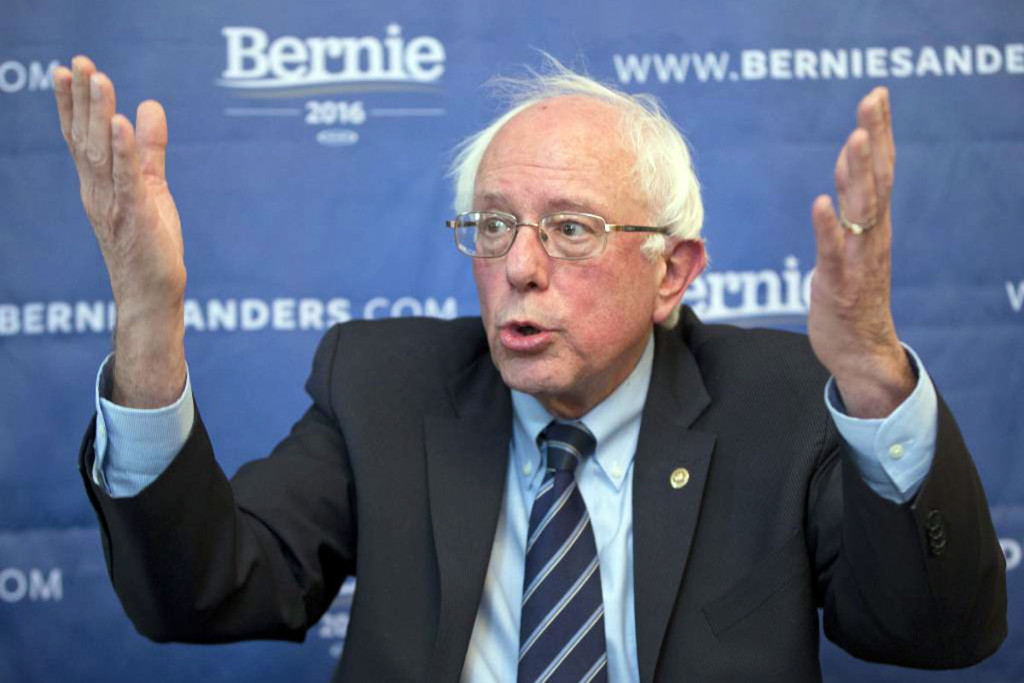
More than any candidate for elected office I can remember, and certainly since I’ve been on social media, Senator Bernie Sanders has dominated the discussion of many in my social circle. It’s been remarkable seeing many I’ve never seen politically engaged before, take part in our democratic process. He’s awakened political interest in many, and for that he should be applauded.
Having noted that, some of the narrative surrounding Senator Sanders irks me. In the interest of full disclosure, I don’t count myself among those who #FeeltheBern. I think a voice like that of Senator Sanders is crucial to our future as a country, and reflects a substantial constituency that, historically, has either been marginalized or out and out ignored. His views are an important contribution to the multitude of views of how to make this country the best it possibly can be.
However, no matter how noble his character, I don’t believe Senator Sanders’s approach to governance is the best path forward for America. The reason comes down to a fundamental question of government: How effective do you believe the government is as a provider of goods and services? The guiding principles of how Senator Sanders plans to govern necessitate a prohibitive (for me) amount of faith in the government to be an effective provider of those things that allow for our way of life. Senator Sanders, by declaration of his own platform, wishes to centralize many of the services utilized by Americans under the umbrella of federal bureaucracy.
Don’t get me wrong here. I’m not some wingnut Libertarian who thinks we need to eliminate virtually all government and privatize everything down to things like fire departments and highway construction. But having worked tangentially with government agencies and directly on issues of public policy for basically a decade, I am uncomfortable with the degree to which Senator Sanders desires to centralize our economy and redistribute wealth. Some government is good. The amount of government Senator Sanders aspires to create were he to be elected President of the United States is excessive, in my opinion.
The above paragraphs are here simply to provide illustration of where I stand on Senator Sanders as a political candidate. I include them to ensure what comes next are not viewed as some opportunistic attack on him or some backdoor endorsement of either Secretary Clinton or one of the Republican candidates. I wish to provide neither. I am, however, fine with asserting on record that I find everything about Donald Trump abhorrent.
Further important context: I like Bernie Sanders the person. He seems sincere in the issues for which he advocates, and the longevity and consistency of his advocacy of those issues is remarkable. In terms of his core beliefs, Bernie Sanders seems to have been true to them for as long as he has held elected office. That’s rare among career politicians, and is worthy of acclaim, regardless of whether or not you agree with him. A man of such startling conviction on the issues he’s advocated for – which notably includes his being on the right side of history in terms of gender equality, racial and social justice, LGBT rights, and the overwhelming majority of issues pertaining to the ethical treatment of our fellow humans – is a man worthy of esteem. We should aim to the same level of humanistic empathy Bernie Sanders has embodied and espoused his entire political career.
But, and that’s where this essay takes a turn, that doesn’t mean he’s immune to calculated political posturing, either. This is a man who has successfully held elected office for more than 35 years, and it’s insane to believe he doesn’t have a keen understanding of how the campaign game is played. And we finally arrive to the place in the essay where I talk about the things that annoy me about Bernie Sanders, of which there are two that really stand out. These opinions are based on my professional experience and relevant work in the public sphere. The purpose of this essay is to provide context and insight that I haven’t otherwise seen anywhere else. So, here we go…
The #Humblebrag of Bernie Sanders flying middle seat coach
By now, you’ve all seen this photo, or one like it:

At first blush, it’s totally charming. Hey, look at that! Man of the people! Sitting there in the crappy middle seat just like the rest of us! That’s a guy who gets it. That’s a guy who doesn’t put himself above the electorate. That’s who I want in a president!
But the more I thought about it, the more it annoyed me. Why the hell would Senator Bernie Sanders, a man running for the most important elected office in (probably) the entire world, and a man who is on the road an unholy amount of time, subject himself to the irritations of common air travel? I have two theories, but first a quick digression.
When I worked in my corporate job, I was on the road probably 25% of the time on average. One week a month I had a take a trip by plane. When you’re on the road even that much, you become intimately familiar with the indignities and hassles of air travel. Traveling one week a month (or about 30 flights a year), afforded me certain perks that made the experience notably less terrible. Early check-ins, priority boarding, less rigorous security screenings, and seat upgrades were among the benefits realized. Not having to experience the full headache-inducing rigmarole of the air travel jamboree helped me do my job better, which brings me back to Senator Sanders.
Why the hell is a man whose travel schedule certainly puts me and my worst stretches in corporate communications to shame by a mile, traveling in this way? Two theories:
1. His logistics team hasn’t mastered the airlines’ self-created loyalty system and Senator Sanders is bargain hunting airfares as if he’s the average rube family who goes on one flight every two years. Those poor folks always end up at the back of the plane in middle seats that aren’t even together, victims of seasoned business travelers who navigate the system much more efficiently and score choicer seats with better benefits. Given that we’re talking about a team of relentless political operatives who have to know the ins and outs of almost everything to run an enterprise this enormous with any degree of efficiency, this option seems unlikely.
2. Bernie Sanders is deploying a brand proposition and shamelessly pandering to his constituent base, who are eating this populist shit up with a spoon. He emboldens his Average Joe street cred by flying in the middle seat of coach and gives the people who already love him yet more fodder for sticking it to those they believe are oppressing them. It’s either craven opportunism, or, now that I think about it a little further, it’s possible Senator Sanders is trapped by his own persona where if he were to upgrade to first class like any rational thinking person who travels enough to earn those upgrades would, any photo taken of him in that seat would demolish his mystique. Think about your own life and how you feel about air travel. If your job required you to fly constantly, wouldn’t you take the free upgrades every single time? Of course you would.
Bernie Sanders either can’t upgrade because he’s actively grandstanding to curry your favor, or is trapped in that seat because seeing him anywhere else would diminish (at least a little bit) your fondness for him. Either way, I know if I had to travel this way as much as Senator Sanders does, my job performance would suffer. Is the brand proposition worth it, especially if you’re 74 years-old? It seems it is, considering just how much I see people post about this, which, also allows for a lot of crowd-sourced publicity. This brings me to my second big gripe…
The conspiracy of the lack of mainstream coverage of Senator Sanders’ campaign
Before we dive headfirst into this one, I’ll grant that some of the coverage choices by mainstream cable networks of the Presidential campaign are baffling. For instance, CNN chose to show Donald Trump’s empty stage instead of Senator Sanders’ speech that same night, and the Sanders campaign rightfully showcased this. That, to me, is poor journalism and justifiably fuels the anger and fear of cronyism felt by Sanders’ constituent base.
Despite that, the claims of lack of coverage are not only overstated, but completely ignore the fact that this is exactly how the Sanders campaign wants you to feel through a calculated media strategy. How do I know this? For starters, I’ve worked in media relations for the last decade and understand firsthand the importance of developing a coordinated coverage plan designed both to embolden your client’s (or in this case, candidate’s) public persona. Second, I understand just how challenging it can be to differentiate your candidate in a crowded political landscape, especially when you’ve got someone like Donald Trump dominating the coverage. I’m no Trump fan, but I acknowledge that his one true gift is understanding how to keep himself at the top of the news and garner a remarkably disproportionate share of the headlines. His abilities in this arena are truly unparalleled.
So, why no coverage for the Sanders campaign? Because that’s exactly what they want you to think. It’s not that the media is denying the Sanders campaign coverage, it’s my professional opinion that the Sanders campaign is actively discouraging it in order to play up the conspiratorial suspicions of his followers. Wall Street is gouging you! Corporations are pillaging this country! And The corporate media is complicit in this. They’re in Wall Street’s pocket!
The first time I had this suspicion is when 9News anchor Kyle Clark posted this commentary detailing 9News’ many attempts to reach the Sanders campaign, and their flat out refusal or inability to respond. Clark suspected that the Sanders campaign was surprised by its own success and overwhelmed by the volume of media requests they received.
It’s a fine theory, and it’s possible Clark is deigning to accuse the Sanders campaign of chicanery because that would be a) speculative, and b) sort of off-brand for a respected political reporter, but I think it underestimates the shrewdness of the staff hired by a man who’s been a professional politician and campaigner for more than 35 years. Is it realistic to think these folks are overwhelmed by simple interview and comment requests from local news stations? Please. The first thing you do as a communications professional on any project likely to receive media inquiries is write an FAQ document to address the most common ones. It’s a totally rote task to check off the list, and it’s part of the interplay game between reporters and those seeking coverage. It’s the system, and while it’s flawed, anyone who’s worked more than six months in this vocation understands it and can accommodate it.
Which is why I think the Sanders campaign is so diabolically brilliant. They looked at the landscape, saw their potential slice of the coverage pie, recognized it would be miniscule against the Trump steamroller, Hillary Clinton’s more than two decades working in the political front and center, and the clown car of Republican primary candidates, and said fuck it, let’s go in the opposite direction. Let’s actively seek the least amount of mainstream coverage possible and plant the seed in the minds of our constituents that we’re victims of corporate media stoogery.
It’s a strategy that’s not only cheaper and much less time intensive from a simple tactical standpoint, but plays into the already-existing fears of your followers. You galvanize your position as the outsider and inspire thousands upon thousands of pissed off social media posts from your most fervent believers. In essence, you’ve crowd sourced your entire media relations practice and created a brilliant brand differentiator for your candidate in a way that money and traditional media tactics cannot buy you. From a purely professional standpoint, my hat is off to whoever is in charge of this for the Sanders campaign. You’re doing incredible work.
It’s impossible to manufacture something like this without everyone seeing right through it:

That’s got to come from outside the campaign, and while you absolutely cannot have any campaign fingerprints on it or else the whole jig is up, it’s only through a) having a populist outsider candidate with a motivated grassroots following, and b) manipulating the environment so that something like that can come into being. How do you do that? Well, I have no firsthand knowledge of what the Sanders campaign did or didn’t do, but here are some tactical choices I’d make to facilitate this. Don’t directly invite any media members. Make obtaining media credentials an arduous pain in the ass. Rope the press off into a crappy vantage point. Make the campaign unavailable for questions before or after the rally. These are but a few of any number of simple-but-dastardly things you can do to ensure lack of mainstream media coverage and empower your followers to do the jobs the media is supposedly falling down on.
Can I confirm the Sanders campaign is actually doing any of this? Of course not. It’s possible they’re feckless, as implied by Kyle Clark’s editorial conjecture, and unable to handle the demands of a relentless onslaught of inquiries from all across the country. Maybe it’s a staff of newbs who don’t have a good handle on the interplay between event logistics and media relations. Or maybe the entire corporate media complex is conspiratorially working together to silence Bernie Sanders and his supporters to ensure the status quo is maintained. Does any of that seem likely to me? Absolutely not.
Bernie Sanders seems like a good dude. But he’s running for President of the United States, an act that requires an abnormal amount of narcissism, self-regard, and incisive tactical acumen. And you have to surround yourself with a whole team of people wired in a very similar way. Using only the knowledge and insight I’ve gained in my chosen profession, it seems likely that the Sanders campaign is taking an oppositional approach to its media relations strategy and solidifying the Senator’s brand in the process. And they’re doing an amazing job at it.
So the next time you lament the craven machinations of any of the other candidates or wring your hands over the unfair treatment your candidate receives, perhaps you should think critically about how maybe you’re acting exactly the way your preferred candidate’s team wants you to. Politics is a game played with live ammo. Don’t think one candidate is coming into this without weapons of his own.
